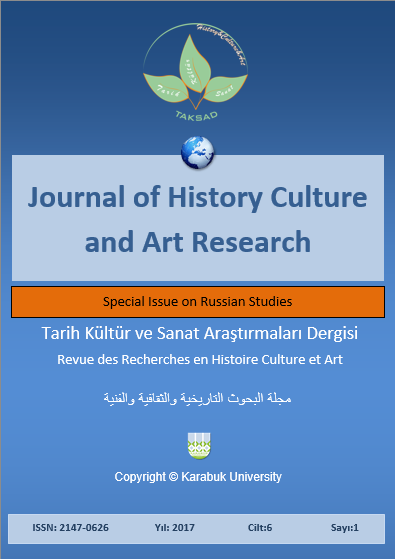Semantic Classification of the Proverbs of the Tatar Language with Numeral-Component "Бер" (One)
DOI:
https://doi.org/10.7596/taksad.v6i5.1291Keywords:
Linguistics, Proverbs, Classification, Tatar language.Abstract
This paper considers the proverbs of the Tatar language with a numeral component «бер» / “ber” (one). Reasoning from the meaning of the numerals used in the introduced phraseological units, conditional semantic groups have been formed. In the course of the analysis, we have identified two large semantic groups: “Greed” and “Character traits”, and the subgroups within these two large groups. As a result of the analysis, it has been found that the combination with the noun «бертиен» (one kopeck) is used together with the words having a negative connotation. In most of the examples given, the character traits are rendered in combination of the numerals with the noun («бертиен» (one penny), «беркашыксу» (a spoonful of water), and the negative connotation of the proverbs is conveyed by means of the words with negative meanings such as «сусалмас» (someone will not give water); «каратиргә төшеп сатулашу» (bargain to all of a sweat), etc. The results of this work can be used in further studies of the semantics of numerals used in proverbial sayings; in formulating a classification of phraseological units with a numeral component; for comparative-contrastive analysis of the translations of set expressions from one language to another.
References
Avezova, B. S. (2016). The Structural-Semantic Analysis of Noun Phraseological Units with the Numeral “One” in English, Russian, Tajik and Hindi. Philological Sciences in MSUFA, 7, 6-23.
Bayasgalan, S. (2006). Semantics of Numerals in the Phraseology of Mongolian, Russian and English. Thesis for Candidate of Philology. St. Petersburg.
Ganiev, F. А.; Abdullin, I. А.; Mukhamadiev, М. G. & Yunaleyeva, R. А. (1995). The Tatar-Russian Dictionary. Кazan: Tatar Publishing.
Madzhidov, Kh. (2006). Phraseological System of Modern Tajik Literary Language. Dushanbe: Devashtich.
Rakhimova, E. F. (2013). About National and Cultural Specificity of Bashkir Phraseological Units With Qualitative Meaning: Linguo philosophic Aspect. The Herald of Bashkir University, 18(4), 1209-1213.
Safiullina, F. S. (2001). Tatar-Russian Phraseological Dictionary. Kazan: Magarif.
Sharifullin, B. Y. (2014). The Linguistic View of the World of «The Beatles»: The Cognitive-Typological Reconstruction. Germany: Lambert Academic Publishing.
Әхәтов, Г. Х. (1982). Татар теленең фразеологик әйтелмәләр сүзлеге. Kazan: Tatarstan book publishing.
Исәнбәт, Н. С. (1989). Татар теленең фразеологик сүзлеге. Ике томда. V. I. Kazan: Tatarstan book publishing.
Исәнбәт, Н. С. (1990). Татар теленең фразеологик сүзлеге. Ике томда. V. II. Kazan: Tatarstan book publishing.
Downloads
Published
How to Cite
Issue
Section
License
All papers licensed under Creative Commons 4.0 CC-BY.- Share — copy and redistribute the material in any medium or format
- Adapt — remix, transform, and build upon the material for any purpose, even commercially.
Under the following terms:
Attribution — You must give appropriate credit, provide a link to the license, and indicate if changes were made. You may do so in any reasonable manner, but not in any way that suggests the licensor endorses you or your use.
- No additional restrictions — You may not apply legal terms or technological measures that legally restrict others from doing anything the license permits.







